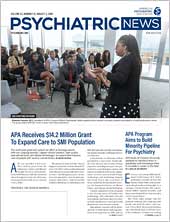Due to the current social and political environment, the time has come for our organization to strategize more ways to increase access to high-quality mental health care to all patients—especially individuals who are members of marginalized groups.
I am well aware both as APA president and in the work that I do on a daily basis that the current social and political environment in this country is causing traumatic reactions in many of our communities. Federal policies that harm immigrant children and their families, police brutality toward minority youth, and proposed regulations to ban transgender people from serving in the military are just some of the actions that are heightening individuals’ feelings of anxiety and fear. It is APA’s responsibility to help ensure that all APA members are prepared to provide the best—and most culturally sensitive—mental health services to patients needing our expertise.
This year, APA’s fall meeting, IPS: The Mental Health Services Conference, will be held in Chicago from October 4 to 7 on the theme “Reimagining Psychiatry’s Impact on Health Equity.” The purpose of the meeting is to highlight educational programs and innovations in clinical services designed to ensure equal access to high-quality mental health care—that is, health equity—to all populations regardless of race/ethnicity, age, religion, nationality, sexual orientation, gender identity, socioeconomic status, or geographical background.
Health equity must be addressed at multiple levels including practice settings, educational activities (including those for trainees as well as practicing psychiatrists), and organizations and institutions. This year’s IPS will be a highly diverse interactive program to address issues and solutions for these different levels with engaging topics. Some session highlights:
•
Dismantling Stigma in Communities of Color
•
Black Mental Health in the 21st Century
•
From Cultural to Structural Competency—Training Psychiatry Residents to Act on Social Determinants of Health and Institutional Racism
•
Addressing Social Determinants and Health Disparities Using Technology
•
Trans People in the Military: Mental Health Concerns for Active Duty and Veterans and the Impact of Being Allowed to Serve Openly
•
Do Organized Minority/Underrepresented Groups Make a Difference in Promoting Health Equity and Diversity in Leadership?
You’ll also find a number of other topics that have helped make this the go-to meeting to interact with experts on the latest clinical information. Among the meeting’s clinical tracks are addiction psychiatry, psychopharmacology, collaborative care, technology (including telepsychiatry and mental health apps), and physician wellness.
I look forward to welcoming you to Chicago and getting an opportunity to meet you. I know you’ll want to join me in learning the latest about what each of us can do to ensure mental health equity among all our patients.
I would like to thank Dr. Glenda Wrenn, chair of the IPS Scientific Program Committee, for her assistance in writing this article. More information on this year’s IPS is available here. ■

